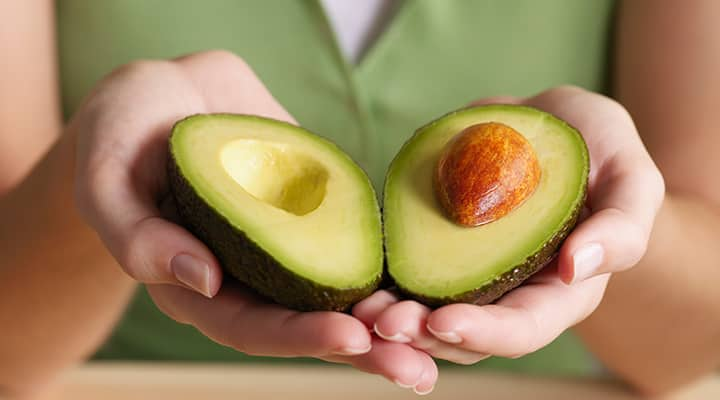
Mediterranean Diet vs. Keto: Which is Better?
Published: January 2022
Two very different diets have gotten a lot of attention lately: the Mediterranean diet, in which you dine like you live in Greece, and the ketogenic diet…in which you’re allowed to eat bacon grease!
You may have friends who feel like they’re the healthiest they’ve been in years thanks to the magic of the “Med diet,” while others rave about the thrill of being in “ketosis” while standing in front of you, eating an avocado as if it’s an apple.
So what’s involved when you go on a Mediterranean or keto diet, and what are the benefits and drawbacks of each approach? Let’s take a deep look at how the Mediterranean diet and the ketogenic diet compare to each other—and which, ultimately, will help you achieve your healthy weight goals.
What is the Mediterranean diet?

Historically, the countries bordering the Mediterranean Sea—like Greece, Italy, and Spain—have followed a unique diet that hinges on plenty of healthy fats, whole grains, nuts, and produce. Food from the earth is the focal point, while processed, refined, and artificial foods/ingredients are avoided. There is a moderate intake of fish and poultry, and a low intake of dairy, red meat, and sugar.
Following the Mediterranean diet also means leaning into the region’s traditional flavors, seasonings, and cooking methods. Get ready for a lot more garlic and extra-virgin olive oil in your life!
3 health benefits of the Mediterranean diet
Is the Mediterranean diet healthy? While it offers a vast range of benefits, here are some of the highlights.
1. Optimal cardiovascular health:
Following this diet supports better heart health—including supporting already-healthy blood pressure levels. Compared to a low-fat diet, the Mediterranean diet has been shown to be more effective at promoting already-healthy cholesterol levels, as well as keeping your blood vessels healthy. This plays a huge role in overall heart health. In a large multicenter trial including 7,447 participants, those on a Mediterranean diet who supplemented with olive oil or nuts were approximately 30% more likely to maintain cardiovascular health.2. Healthy brain function:
Research suggests that the Mediterranean diet could support your cognitive performance, attention, and memory, making it excellent for us as we age. In one study including 23,232 men and women aged 40 to 77, greater adherence to the Mediterranean diet was associated with healthy brain function. Yet another meta-analysis of 17 studies including over 40,000 people found that the Mediterranean diet has beneficial effects on cognitive function in healthy older adults.3. Already-healthy blood sugar support:
Following this diet, which emphasizes fresh foods and lean proteins, can help maintain already-healthy blood sugar levels and metabolism.Mediterranean diet foods: what to eat, what to avoid

Before starting any new diet, it helps to educate yourself about what you can and cannot eat, as well as research recipes in advance. So, what foods are on the Mediterranean diet?
The Mediterranean diet allows for a wide variety of delicious, wholesome, nutritious eats.
- Healthy fats (olives, avocados, healthy oils like extra virgin olive oil)
- Fruits
- Leafy vegetables
- Cruciferous vegetables (broccoli)
- Nuts and seeds
- Whole grains
- Legumes (which can help boost your metabolism)
- Fatty fish (salmon)
- Moderate wine (red only)
Note that the Mediterranean diet is largely plant-based. While part of the diet, animals and animal byproducts are limited.
Avoid these foods:
- Anything processed (meat or otherwise)
- Added sugars (think soda and candy)
- Refined grains and oils
- Trans fats (what you’d get in fried foods)
What is the keto diet?
The ketogenic (or keto) diet is very low in carbs and high in fat. Physicians introduced it in the 1920s as a neurological regimen—not for weight management or as a “mainstream” approach to healthy eating. However, in more recent years, it exploded in popularity, particularly for burning fat.
What is ketosis?
When your body is in ketosis, it’s using fat for fuel instead of carbohydrates (which are the body’s main source of fuel). This is because when you follow the keto diet, the number of carbs you eat is drastically reduced. So, your body switches over to using burning fat to make ketones, which are then used for energy.
To switch to a state of ketosis, you need to drop your carbohydrate intake down to 50 grams or less per day. According to Life Extension registered dietitian Holli Ryan, “To truly reach a state of ketosis, it involves testing your urine for ketone bodies and following a strict eating pattern that includes very high fat, moderate protein, and very low carbohydrate intake.”
Is the keto diet healthy?

A better question might be this: Can the ketogenic diet be healthy? Yes, it can—under the right circumstances. As with any diet, you need to monitor yourself.
It’s a good option for people in specific situations, too: if you’re concerned about maintaining already-healthy blood sugar levels, then the keto diet might be a smart option for you. However, you should speak with your physician first.
If you are looking to manage your weight, there are safer, more sustainable options than keto. Because carbs and even protein are limited on this diet, you might find yourself lacking in nutrients. You might also be missing out on important micronutrients. Furthermore, eating significantly more fat can affect your liver or kidneys.
Plus, when you don’t get the carbs your body wants, you can experience tiredness, and it can affect your mood. Add to this the fact that with how low your carbs are, the keto diet can be difficult to sustain. People often think that keto supports a healthy weight because it’s low-carb. But your body wants carbs! Fifty grams (or less) per day isn’t realistic for most people.
Keto diet foods: what to eat, what to avoid

The good news about keto is that you get to eat plenty of fat, which is what makes food so delicious and flavorful. Here are some suggestions for your ketogenic diet list:
- Eggs
- Dairy
- Yogurt
- Nuts and seeds
- Dark chocolate
- Red meat, poultry, and fish
- Low-carb fruits and vegetables
- Healthy oils
On the other hand, avoid these:
- Grains
- Added sugar
- Starchy vegetables
- High-sugar fruits
- Bread and baked goods
- Processed foods
Mediterranean vs keto: A comparison of the benefits and risks

The Mediterranean and keto diets have something in common: they both permit healthy fats. While keto does allow much more, both emphasize the consumption of foods like avocados and extra virgin olive oil. This makes for a number of important health benefits.
They have something else in common, too: one recent study found that the keto diet was similar to the Mediterranean diet in providing benefits for healthy weight and supporting already-healthy blood sugar levels. They can both also promote brain health. However, more studies are needed to further compare the benefits of the two.
But keto is much more restrictive and places bigger demands on what you can and cannot eat—which means you might be cutting important nutrients from your diet. Furthermore, people sometimes think that a high-fat diet means you can slather butter on a fatty ribeye steak and call it a day. However, you still must be able to distinguish between different types of fats, and choose the healthier types (i.e. unsaturated).
The Mediterranean diet offers more variety, especially in the produce and whole grain department, and thus stands to be more nutritious and easier to stick to.
“Unless medically necessary, a ketogenic diet does not appear to be a good optionlong-term, but can be helpful short-term,” explained Ryan. “The Mediterranean diet is a better option as it can be part of a sustainable lifestyle since it offers enough variety, among other benefits.”
Do you manage a healthy weight better on the keto or Mediterranean diet?

A lot of people have celebrated healthy weight goals after switching to keto. While their accomplishments aren’t to be downplayed, this often happens because either (a) they’re simply eating healthier than they used to be, or (b) they’re restricting their daily calories as a result of the restrictive diet.
Ultimately, weight management with keto can be quicker than other approaches—but, when it comes to losing weight—and keeping it off—the best diet is the one that you can stick to long-term. Consistency is key. The Mediterranean diet offers much more breathing room and will make your weight management easier over the long run.
Importantly, remember that portion sizes and physical activity are also important factors.
Explore Our Best Weight Management Supplements
Can you do the keto and Mediterranean diet at the same time?
There is some overlap between the two diets, yes. If you’re doing keto, you can’t follow the Mediterranean diet, since keto limits your carbs so drastically. If you’re on the Mediterranean diet, then you could potentially make it keto by reducing your carbs—but with a carbohydrate restriction, it’s not really the Mediterranean diet anymore.
In other words, you can eat a keto diet using foods from the Mediterranean diet. But you’re doing it at the cost of Mediterranean diet staples, like whole grains. Interestingly, though, one pilot study found that adhering to a keto-Mediterranean diet supported already-healthy cholesterol levels, body weight, BMI, waist circumference, and already-healthy triglyceride levels.
So, it could just come down to finding the right balance.
Is the Mediterranean diet better than keto?
“Better” is subjective, because it really depends on your goals, needs, and wants. Keto is often used as a shorter-term diet to help manage weight, and there is insufficient data on long-term adherence. It’s more restrictive than the Mediterranean diet, so it may provide fewer nutrients. It might also be harder to maintain for some people given its restrictive nature.
The Mediterranean diet focuses on a lifestyle change of eating healthy, fresh foods. Keto focuses on limiting sugar from carbs to help burn fat.
Supplements to complement your diet

In a perfect world, you get all the nutrients you need directly from food. But these days, that isn’t feasible. That’s where supplements come in. Supplements don’t replace a healthy diet. They complement them!
Here are two weight management supplements to complement yours.
1. Body Trim and Appetite Control
If you’re considering one of these diets to help you burn body fat, you might like Life Extension’s Body Trim and Appetite Control. The lemon verbena and hibiscus extract help you feel satiated, inhibiting overeating and mindlessly snacking, and fighting off those overwhelming cravings.
2. Fish Oil
Fish oil is especially beneficial if you want the added healthy fats of the ketogenic diet without the restriction, making it an excellent supplement for the Mediterranean diet. Fish oil offers the similar benefits for your cardiovascular health and cognitive functioning. A quality supplement can also help you support a healthy balance of omega-3 and omega-6 fatty acids since most Americans consume omega-6 in very large quantities.
Don’t forget that both diet and exercise matter for weight management. Also, prioritize your mental health, drink plenty of water, and get enough sleep. Your wellness requires a multifaceted approach. Pursue it holistically, and your body will thank you.
References
- Calton J. “Prevalence of micronutrient deficiency in popular diet plans,” Journal of the International Society of Sports Nutrition, June 2010, https://www.ncbi.nlm.nih.gov/labs/pmc/articles/PMC2905334/
- Jimenez-Torres J, et al. “Mediterranean Diet Reduces Atherosclerosis Progression in Coronary Heart Disease: An Analysis of the CORDIOPREV Randomized Controlled Trial,” Stroke, November 2021, https://pubmed.ncbi.nlm.nih.gov/34372670/
- Loughrey DG, et al. “The Impact of the Mediterranean Diet on the Cognitive Functioning of Healthy Older Adults: A Systematic Review and Meta-Analysis,” Adv Nutr., July 2017, https://pubmed.ncbi.nlm.nih.gov/28710144/
- Martín-Peláez, S, et al. “Mediterranean Diet Effects on Type 2 Diabetes Prevention, Disease Progression, and Related Mechanisms. A Review,” Nutrients, July 2020, https://www.ncbi.nlm.nih.gov/labs/pmc/articles/PMC7468821/
- Martínez-González MA, et al. “The Mediterranean Diet and Cardiovascular Health,” Circ Res., March 2019, https://pubmed.ncbi.nlm.nih.gov/30817261/
- Nissensohn M, et al. “The Effect of the Mediterranean Diet on Hypertension: A Systematic Review and Meta-Analysis,” J Nutr Educ Behav., January 2016, https://pubmed.ncbi.nlm.nih.gov/26483006/
- Paterson, K et al. “Mediterranean Diet Reduces Risk of Incident Stroke in a Populations With Varying Cardiovascular Disease Risk Profiles,” AHA Journals, September 2018, https://www.ahajournals.org/doi/10.1161/STROKEAHA.117.020258
- Tricò D, et al. “Effects of Low-Carbohydrate versus Mediterranean Diets on Weight Loss, Glucose Metabolism, Insulin Kinetics and β-Cell Function in Morbidly Obese Individuals,” Nutrients. April 2021, https://pubmed.ncbi.nlm.nih.gov/33919503/
- Vinciguerra, F, et al. “Influence of the Mediterranean and Ketogenic Diets on Cognitive Status and Decline: A Narrative Review,” Nutrients, April 2020, https://www.ncbi.nlm.nih.gov/labs/pmc/articles/PMC7231139/
- von Geijer, L, et al. “Ketoacidosis associated with low-carbohydrate diet in a non-diabetic lactating woman: a case report.” Journal of medical case reports, October 2015, https://www.ncbi.nlm.nih.gov/labs/pmc/articles/PMC4591635/
Like what you read?
Please subscribe to get email updates on this blog.




